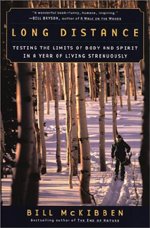 At the age of 37, bestselling author and journalist Bill McKibben stepped out of the ordinary routine of his life to spend a year in "real training" as a cross-country skier. With the help of a trainer-slash-guru, McKibben took on a regimen equivalent to that of an Olympic endurance athlete's, running and skiing for hours every day in preparation for a series of grueling long-distance ski races. What prompted this successful writer with an admitted aversion to competitive sports to push himself so hard, for so long? Partly it was pure selfishness; after a decade as an environmental writer and activist, I needed a break from failing to save the world. But mostly it was curiosity that drove me. By year's end I hoped I'd have more sense of what life lived through the body felt like.
At the age of 37, bestselling author and journalist Bill McKibben stepped out of the ordinary routine of his life to spend a year in "real training" as a cross-country skier. With the help of a trainer-slash-guru, McKibben took on a regimen equivalent to that of an Olympic endurance athlete's, running and skiing for hours every day in preparation for a series of grueling long-distance ski races. What prompted this successful writer with an admitted aversion to competitive sports to push himself so hard, for so long? Partly it was pure selfishness; after a decade as an environmental writer and activist, I needed a break from failing to save the world. But mostly it was curiosity that drove me. By year's end I hoped I'd have more sense of what life lived through the body felt like.If Long Distance begins as a story about the transformation of the body and what it means to challenge one's physical limits, it evolves into a thoughtful lesson about a wholly different kind of endurance. Halfway through McKibben's training, his father was diagnosed with the most virulent form of brain cancer. As McKibben was reaching peak condition, his father's life lurched toward an end, forcing McKibben to snap out of his self-inflicted self-absorption. He had tried to think of endurance as "the ability to fight through the drama of pain. But now I understood it, too, as a kind of elegance, a lightness that could only come from such deep comfort with yourself that you began to forget about yourself." And the elegance of Long Distance is in its ultimate lesson that each of us has a mind, a body, and a spirit, and we must find our strength in all three realms.
I was captivated by it--not for the athletic bits, which are a somewhat disappointing, but for the bits where he talks about the 6 months from when his family finds out his dad has brain cancer to his death. So many of the descriptions and emotions were things that I felt and saw felt two winters ago when I was going down to Rockland house all those weekends to be with my grandfather in his last 5 months... and it makes me want to take up skiing. Anyone up for doing a loppet? I love cowbells.

2 comments:
I have about 3 books in the queue, but I'll add this one in. Sounds like something I'd like. Are loppets related to skiing or cowbells? or both?
Loppets are really long, like 50km+, nordic ski races. When Cara and I were in Ann Arbor, a friend of my mom and step-dad (who are both fitness freaks; biking is their first love--the documents founding the local bike club were signed on his dining room table in the 1970s--but theyski all winter long, well, when they're not spinning on side-by-side setups in the basement) came by to showed my mom some pictures of her trip to Norway (or Sweden?) for a World Cup race. Aparently literally anyone can enter these things... All the spectators lining the course--and there ARE spectators for skiing in Scandinavia--ring cowbells as you come through the chute. Plus, I got this fever, and the only prescription is... well, you know.
Post a Comment